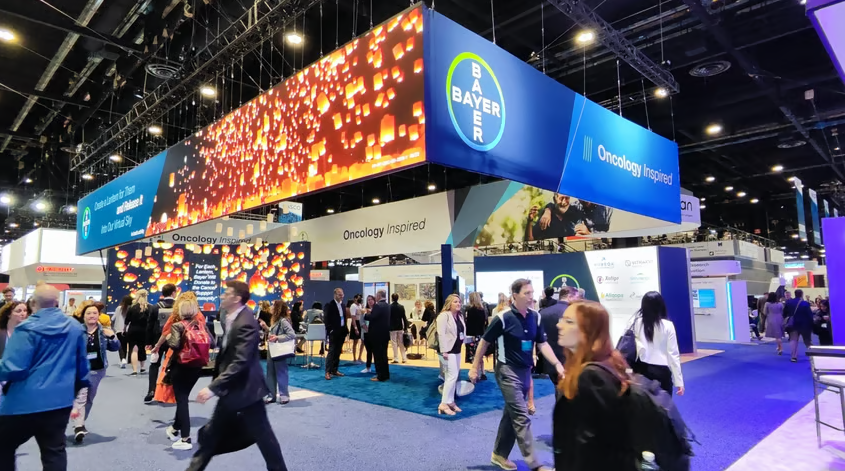Blog
Blog
Bayer needs ‘midsize acquisition’ to reach $10B oncology sales goal, exec says

Bayer recently laid out its ambition to achieve $10 billion in sales from its oncology business by 2030 and become a top 10 cancer drug player. To get there, the company is looking outside for a “midsize acquisition,” Bayer’s oncology chief Christine Roth said.
Right now, Bayer’s Nubeqa leads the charge in the company’s oncology department, with its sales projected to peak at more than 3 billion euros. In addition, the company’s acquisitions of Vividion Therapeutics, BlueRock Therapeutics and Noria Therapeutics in recent years have bolstered its research capabilities.
“We’ve done a lot of activity to fill our early pipeline,” Roth said in an interview with Fierce Pharma on the sidelines of the American Society of Clinical Oncology’s 2023 annual meeting. “But if we want to achieve that top 10 spot in the next four to six years, it’s going to take the right midsize acquisition to get there.”
Roth agreed that $5 billion to $10 billion would be a good value estimate for a midsize M&A transaction. But she also said she’s not “putting a ring fence around the dollar value.” The deal would likely come with a later-stage drug, she added.
The right deal would also fit in Bayer’s focus tumor types and potentially within its three pillars of treatment modalities, Roth said.
Bayer has narrowed its oncology focus to genitourinary cancers, led by Nubeqa in prostate cancer; gastrointestinal cancers, led by Stivarga in colorectal cancer and liver cancer; and lung cancer, where the company has some experience with Vitrakvi for solid tumors driven by NTRK fusion, Tara Frenkl, M.D., Bayer’s head of oncology development, said during the interview.
Bayer also sells the lymphoma therapy Aliqopa. But after the FDA’s scrutiny of PI3K inhibitors for blood cancers—which led to multiple market withdrawals—Bayer isn’t so keen about Aliqopa.
The FDA hasn’t asked Bayer to pull Aliqopa but instead has required that the company combine data from two phase 3 trials—CHRONOS-3 and CHRONOS-4—in a future filing. CHRONOS-3 had already read out. Following a similar pattern with other PI3K inhibitors, Aliqopa showed a massive tumor progression benefit but a concerning trend that suggests potential detriment to long-term survival among patients with previously treated indolent non-Hodgkin lymphoma. CHRONOS-4 could report data next year

Unless those studies really knock it out of the park, I don’t think we see a path forward for filing for additional indications for [Aliqopa],” Roth said.
As for modalities, Bayer has identified precision molecular oncology, next-generation immuno-oncology medicines and radioligand therapies as its top priorities.
Within its research operations, Bayer recently opened a new R&D center at Kendall Square in Cambridge, Massachusetts. The 62,100-square-foot building is now home to a new facility for precision molecular oncology research, where Bayer develops novel targeted cancer drugs.
As one of the first developers of radioligand therapies, Bayer recently started losing out to rival Novartis on the commercial front. But Roth hopes the PEACE III trial, expected to read out in the first quarter of 2024, will help expand Xofigo’s label for Bayer. The phase 3 trial is testing the combination of Xofigo and Astellas and Pfizer’s Xtandi in newly diagnosed castration-resistant prostate cancer that’s metastatic to the bone.
Still, within oncology, Nubeqa is front and center at Bayer.
Last year, Bayer hiked its Nubeqa peak sales estimate to more than 3 billion euros after results from the ARASENS trial showed the androgen receptor inhibitor, used on top of androgen deprivation therapy (ADT) and chemotherapy, could extend the lives of patients with metastatic hormone-sensitive prostate cancer.
A separate phase 3 trial dubbed ARANOTE is testing Nubeqa and ADT without chemotherapy. And Bayer just launched the phase 3 ARASTEP trial for Nubeqa and ADT in patients with nonmetastatic hormone-sensitive disease that’s at high risk of recurrence after surgery or radiotherapy.
Better tolerability has been Nubeqa’s selling point in its competition against Xtandi and Johnson & Johnson’s Erleada. In the first quarter, Nubeqa’s sales more than doubled year over year to reach 178 million euros.
That safety profile makes Nubeqa an ideal partner for potential combinations, including where past combinations have failed because of toxicity. And Bayer is close to inking a collaboration deal for Nubeqa, Roth said.
“That to me says we’ve arrived on the map in prostate cancer,” Roth said.
Bayer has historically had a small oncology presence in the U.S.
“Now, with the growth of oncology, especially through the growth of Nubeqa, we are gaining a presence at scale,” Nelson Ambrogio, Bayer’s general manager of oncology in the U.S., said during the same interview.
Having an ambition to join the ranks of the top cancer drug makers motivates the organization. But to Roth, becoming a top oncology player isn’t just about the statistics but rather building a business to have a bigger impact on patient care.
“The more assets you have, the more clinical trials you put into the marketplace, the more KOLs that you engage, the more patients you touch, it becomes a bit of a self-fulfilling prophecy where you’re more visible, more accessible,” Roth said. “You learn how to work with a broader range of stakeholders. Trials go faster, you can recruit faster, you can contract faster—the machine hums better.”
In another boon to Bayer’s oncology ambitions, a pharma veteran with deep oncology experience just arrived as the helmsman of the entire Bayer group. Bill Anderson, most recently Roche’s pharma chief, officially became Bayer’s CEO on June 1.
Anderson has already talked with the pharma exec team, Roth said, although he didn’t have any instant feedback on any changes.
“It is just so nice to have somebody with deep pharma experience, who can not just ask that first-level question, but he can ask the second level and the third level,” Roth said. “And already we’re learning from his experience leading one of the preeminent oncology companies in the world.”






